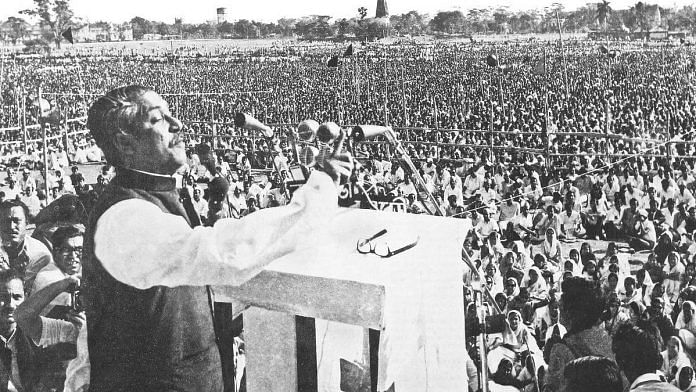New Delhi: It is not just terrorists and gangsters wanted by India that have found safe haven in Canada but also Noor Chowdhury, the man who assassinated Bangladesh’s first president, Sheikh Mujibur Rahman, in 1975 by shooting him multiple times with a machine gun as part of a military coup.
Bangladesh has multiple times sought the extradition of Chowdhury, who escaped to Canada as the Sheikh Hasina government came to power in 1996.
Awarded the death sentence in 1998 by a Dhaka court, Chowdhury, now in his 70s, is yet to get refugee status in Canada as his application for the same has been rejected on several occasions since 1999.
In 2009, the Bangladesh Supreme Court upheld the death sentence awarded to Chowdhury and 11 others involved in the killing of Rahman and his family members. Five of his accomplices were hanged in 2010.
Chowdhury is said to be living in Etobicoke since 1996. Ottawa has not accepted Bangladesh’s requests for extradition, arguing that under Canada’s Extradition Act, a fugitive facing the death penalty in another country cannot be deported.
In 2011, Chowdhury appeared on Canada’s CBC Radio, pleading innocence. He also observed that there was a “vendetta” to deport him to Bangladesh.
Sheikh Rahman, popularly known as Bangabandhu (friend of Bengal), was one of Bangladesh’s most prominent politicians and was at the forefront of the erstwhile East Pakistan’s demand for autonomy.
The first acting president of Bangladesh and later its prime minister, he, along with most members of his family, was assassinated at his Dhaka home by a group of Bangladesh Army personnel as part of a military coup on 15 August 1975.
He is survived by his two daughters, Sheikh Hasina, the current PM of Bangladesh and Awami League leader, and her sister Sheikh Rehana, another Awami League politician.
Last month, on the 48th anniversary of the assassination, Bangladesh Law and Justice Minister Anisul Huq, in an interview to PTI, urged for the return of two “self-confessed killers” of Sheikh Rahman — Rashed Chowdhury from the US and Noor Chowdhury from Canada.
Like Canada, the US and UK have been harbouring Bangladeshi fugitives Ashrafuzzaman Khan and Chowdhury Mueen-Uddin, respectively, accused of murdering Bengali intellectuals during the 1971 Bangladesh Liberation War. Dhaka has been seeking an extradition treaty with the UK over the past year.
“While the whereabouts of Major Shariful Haque Dalim (a principal plotter in Rahman’s assassination) are still not known, we know that Col Rashed Chowdhury is in the US and Noor Chowdhury, another of the coup plotters involved in the killing of Bangabandhu, is in Canada. We are still in talks with the US on getting the killer officer back,” Huq was quoted as saying by PTI.
Also Read: ‘Jail Killing Day’ — when Bangladesh’s four founding leaders were assassinated in jail
Five convicts still at large
After Rahman’s assassination, four Awami League leaders — the first PM of Bangladesh Tajuddin Ahmad, another former PM Mansur Ali, former vice-president Syed Nazrul Islam and former home minister A.H.M. Qamaruzzaman — were imprisoned in Dhaka jail, and later killed in prison.
Between 1975 and 1996, Bangladesh experienced numerous military coups under leaders such as Khaled Mosharraf and Ziaur Rahman. During this period, army officials responsible for violence during the 1975 coup were awarded diplomatic positions. Chowdhury was made the second secretary in the embassy in Tehran in 1976 and held the position until 1996.
After Sheikh Hasina assumed power in Bangladesh in 1996, her government initiated a trial against those accused in the Rahman assassination case by revoking an indemnity law that was protecting the accused.
In 1998, a Dhaka court sentenced 15 men, including Chowdhury and other former army officials, to death in the case.
However, the high court acquitted three in 2001, while the conviction of 12 was upheld. After Hasina lost power in the same year, proceedings were stalled.
The case again progressed quickly in court after Hasina returned to power in 2009.
Of the 12 convicts, the Bangladesh Supreme Court rejected the appeals of five in 2009 and upheld their death sentence while seven others had fled the country. One of the fugitives, Aziz Pasha, died of natural causes in Zimbabwe in June 2001.
In 2010, five convicts, Syed Farooq Rahman, Mohiuddin Ahmed, Bazlul Huda, A.K.M. Mohiuddin and Sultan Shahriar Rashid Khan, were hanged.
Most recently, in 2020, Abdul Majed, a former military captain who was among those on the run, was hanged by Bangladesh after being arrested in Dhaka. Majed reportedly admitted to hiding in Kolkata for over two decades.
The five convicts still at large include Col Khandaker Abdur Rashid (dismissed), Lt Col Shariful Haque Dalim (relieved), Noor Chowdhury, Rashed Chowdhury, and Risaldar Moslehuddin Khan.
(Edited by Nida Fatima Siddiqui)
Also Read: Comparison between India and Bangladesh GDP misleading — former chief economic advisor



